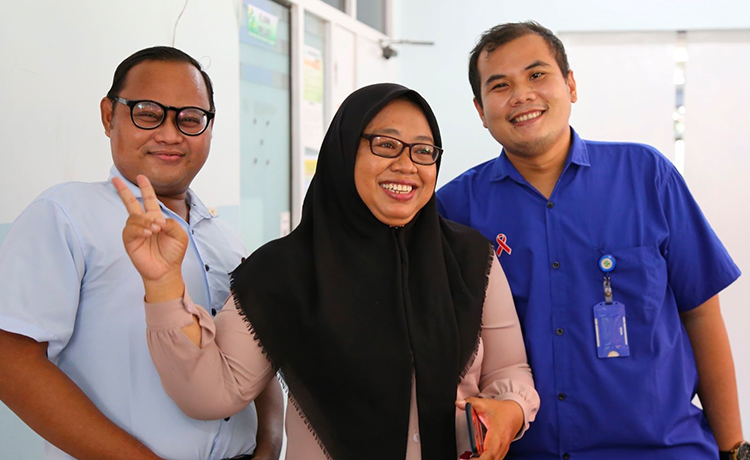News
UNFPA-supported cash vouchers programme eases access to care for women living with HIV in Indonesia
- 14 December 2023
News
Jakarta, INDONESIA – “When I first learned that I had HIV, I felt like my world was falling apart,” 39-year-old mother-of-two Wati* told UNFPA, the United Nations sexual and reproductive health agency, in 2022.
“What’s worse was that my husband was really sick. He couldn’t work; there was a time when we didn’t have anything to eat.”
Wati only found out she had HIV after her husband was hospitalized and tested positive for the virus. It’s an unfortunately familiar story for many women living with HIV in Indonesia; data show about one in three people do not know their status.
Today, an estimated 190,000 women over the age of 15 are living with HIV in the country. New infections among women have increased by over 40 per cent in recent years; meanwhile, the onset of the COVID-19 pandemic has further jeopardized access to HIV treatment and exposed women to economic hardship and discrimination.
“Women and girls can face difficulties negotiating safer sex due to unequal power balances, and often have limited access to information about HIV prevention and fewer resources to access preventive measures. Sexual violence also increases the risk of HIV transmission,” said UNFPA Executive Director Dr. Natalia Kanem in a statement on World AIDS Day.
“Ending AIDS as a public health threat by 2030 requires halting the epidemics of gender inequality and of the gender-based violence that fuel its spread.”
Paving the way to treatment
Wulan*, 39, is a single mother living with HIV. She lost her husband to complications from the virus, and has since found it challenging to make ends meet. The mother-of-two worked three shifts a day – one at a factory in the morning, followed by two making food at a canteen – until early 2021, when she was injured by a forklift and forced her to give up her cooking job.
Although she works six days a week, “the money I make from the factory is not enough”, she said. Her daily pay comes to about $5.50.
The COVID-19 pandemic worsened the financial stress faced by many households across Indonesia. Three in four reported earning significantly less in October and November 2020 than in January of that year.
For women living with HIV, cost, distance and stigma can present major barriers to treatment. About one in four people living with the virus in Indonesia are receiving antiretroviral (ARV) therapy, a treatment tool that halts the virus from multiplying and suppresses it to undetectable levels.
To ease these challenges, UNFPA launched a programme in 2020 offering cash vouchers to people living with HIV. Since its inception, nearly 800 people have participated in the programme, receiving cash vouchers upon accessing HIV treatment as well as health-care services ranging from counselling to sexual and reproductive health care.
Wulan lives a 45-minute motorcycle ride from the hospital in Gresik in eastern Java, where she picks up her HIV medicine every month. The cash vouchers programme has helped her pave a path towards improved well-being.
“I have more money for transportation to pick up my medicine. The rest, I can use for other needs like my children’s pocket money – so I am thankful,” she told UNFPA in 2022. “I am happy because the virus is undetected now.”

Building compassion and community
UNFPA also works to strengthen peer support networks for women living with HIV in Indonesia. Wulan first met her support group at the hospital to which she was referred after testing positive for HIV, and heard about UNFPA’s cash voucher programme through its members.
“I have no choice but to accept the fact [of my diagnosis],” she said. “There are peer supporters who help. After feeling down for some time, I feel better now.”
One of those peer supporters, Rizki, works to ensure people living with HIV know what their diagnosis means – and what it doesn’t. “Most people think that your life will be cut short because of HIV. But we share the information that we can lead a long and healthy life,” he told UNFPA in 2022.
Wulan’s family is aware of her HIV-positive status and has remained supportive through her journey to accessing care. She hopes to remarry, but worries there she may not find a match: “I am scared I will not find someone who can accept me, with my condition and two children”, she said.
Sari*, 37, another woman living with HIV in Wulan’s support group, has found a partner with whom she can be herself.
“I was scared about telling him my situation at that time. But he told me there’s no need to be afraid of another human being,” she said in 2022. “He accepts me for me.”
*Names changed for privacy and protection